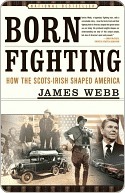More on this book
Kindle Notes & Highlights
They came to America and took the land that no one else wanted, a difficult movement to sell in today’s politically correct environment, since in many eyes they took it from the Indians.
These are loyal Americans, sometimes to the point of mawkishness. They show up for our wars. Indeed, we cannot go to war without them. They haul our goods. They grow our food. They
sweat in our factories. And if they turn against you, you are going to be in a fight.
The Jacksonians, he indicated, are “instinctively democratic and populist.” They believe “that the government should do everything in its power to promote the well-being—political, moral, economic—of the folk community. Any means are permissible . . . so long as they do not violate the moral feelings or infringe on the freedoms that Jacksonians believe are essential in their daily lives.”8
The second is that the tenets of Jacksonianism have expanded beyond the Scots-Irish to become the dominant political code of America’s working class, including the more recent immigrant communities in the North. “American Catholics, once among the world’s most orthodox, remained Catholic in religious allegiance but were increasingly individualistic in terms of psychology and behavior. . . . Urban immigrants may have softened some of the rough edges of Jacksonian America, but the descendants of the great wave of European immigration sound more like Andrew Jackson from decade to decade.”11
They had lost to the Romans because they were consistently hampered by one tragic flaw: they were adamantly tribal, gathering not as nations but instead following the lead of a long succession of warrior princes, and thus defied modern notions of political unity.
They had built their nation from below, family by family, glen by glen, oath by oath, not through some impersonal, didactic Norman pyramid based on obligations tied to real estate but instead through the Celtic way of blood loyalty, locked elbows, and the honor of raising swords in unison. They would march and they would fight and many of them would die, all for a new and rare concept that even then they dared to label freedom.
rout.
Church had largely transitioned from a religious into a commercial power, and at the same time had allowed its positions of religious authority to become little more than sinecures to be held at the pleasure of an ever-fickle royalty.
Spiritually, the Church was bankrupt. As one example of how badly its sanctions were abused, in 1532, King James V, while only twenty, “had wrung permission from the Pope . . . to appoint three baby sons, all illegitimate, to be titular abbots of Kelso and Melrose, priors of St. Andrews and Pittenweem, and abbot of Holyrood respectively; a fourth was later made prior of Coldingham and a fifth abbot of the Charterhouse.


